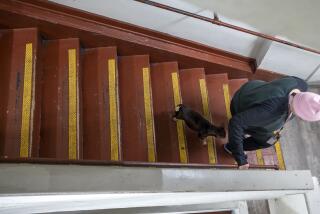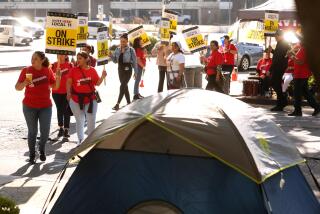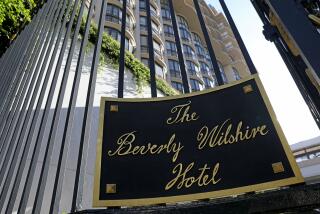Davis, Regulators Reach Agreement : Trustee to Take Over Diversified Properties
SAN DIEGO — A bankruptcy trustee will soon take over management of developer Carroll Davis’ San Diego Diversified Properties, builders of the Radisson Hotel, according to an agreement reached Wednesday between Davis and attorneys for the federal regulators who are owed $27.5 million in defaulted Radisson construction loans.
The agreement, worked out at the urging of U.S. Bankruptcy Judge James M. Meyers, calls for an unidentified but mutually agreed upon trustee to take over San Diego Diversified and to assume control of the 13-story, 264-room Radisson Hotel.
Late Tuesday, Davis filed for protection from creditors under Chapter 11 of the U.S. Bankruptcy Code, a move that canceled the scheduled Aug. 13 foreclosure sale of the Radisson. Under Chapter 11, a company can continue to operate while it reorganizes.
The bankruptcy petition also could exempt the Radisson from the City of San Diego’s filing deadline for building permits in Mission Valley, which was Wednesday. The permit regulation is part of the city’s effort to avoid helter-skelter growth in the area.
Davis has announced plans to build a twin hotel tower and a parking garage next to the existing Radisson facility. However, he has not filed a permit for the project.
Franchise Taken Over
The trustee is expected to take control of the hotel and the parent company within a week, according to the agreement, which is expected to be filed in federal court this morning.
In the interim, Royal Continental Cos. will continue to operate the hotel as a court-appointed receiver, getting 3.5% of the hotel’s gross revenues and 10% of its gross operating profits.
The company took over the Radisson franchise in June after representatives of the Federal Savings and Loan Insurance Corp. replaced Davis three days before the hotel was to be sold at a foreclosure sale.
The sale was later postponed pending a refinancing proposal to FSLIC by Davis. But the federal regulators did not approve Davis’ plan to pay them $15.6 million and issue a $13-million letter of credit from American Savings & Loan. The proposal was turned down because the FSLIC “thought there wasn’t adequate security for the carry back,” according to one source close to the negotiations.
Davis defaulted on the construction loans last year, after the FSLIC’s seizure of San Marino Savings & Loan, which originated the Radisson funding. FSLIC is now San Diego Diversified’s largest secured creditor.
Attorneys for FSLIC argued in court filings Wednesday that Davis should not be allowed to assume control of the hotel. In one document, attorney Frank Christl claimed that there was “substantial evidence of misconduct and self-dealing” by Davis and that he withdrew more than $1 million from the hotel for his other business ventures and for his personal use.
Hotel Called Profitable
Davis’ attorneys countered that most of those funds were for business expenses and that any monies used for personal purposes--such as nearly $54,000 for Davis’ wedding in March--merely represented legitimate spending by an owner of his company’s money.
The controversial 15-month-old hotel is profitable, according to documents filed in court Wednesday.
What remains unresolved is the value of the property. Davis’ attorneys said in court documents that an appraisal paid for by FSLIC put the hotel’s value at $42 million.
However, Christl said in his court filing that the “value of the hotel in its present condition is less than the $27.5 million owed to FSLIC.”
The bankruptcy filing represents the second time in the past three years that Davis has sought court protection from creditors. His Playboy clubs in San Diego and Dallas filed under Chapter 11 in 1982.
“I wanted to avoid this at all costs,” Davis said Wednesday. “It’s tearing me apart, but I’m not going to be pushed around by the government.”
More to Read
Inside the business of entertainment
The Wide Shot brings you news, analysis and insights on everything from streaming wars to production — and what it all means for the future.
You may occasionally receive promotional content from the Los Angeles Times.










